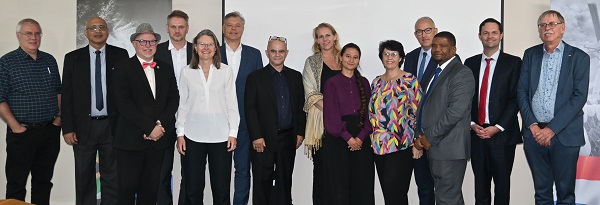Transitioning to green energy is not only important to fight climate change, but is essential for sustainable economies. The biggest and one of the busiest ports in Europe, Port Rotterdam, and the City of Rotterdam in the Netherlands are establishing a hydrogen hub as part of a hydrogen ecosystem to reduce carbon emissions and take the port and the city into the future.
A special delegation from the Netherlands and their embassy in South Africa recently paid a visit to the Department for Science and Technology (DST) Hydrogen South Africa (HySA) Centre of Competence on the Potchefstroom Campus of the North-West University (NWU).
Their goal was to explore potential collaborations and have discussions around hydrogen and green energy transition.
The high-level delegation comprised the mayor of the City of Rotterdam and Rotterdam city officials, as well as representatives from the embassy of the Kingdom of the Netherlands.
Prof Bismark Tyobeka, vice-chancellor, and members of the NWU’s management welcomed Ahmed Aboutaleb, the mayor of the City of Rotterdam and his entourage to the HySA facilities on 9 May.
“Although South Africa currently faces energy challenges such as load-shedding, it does not stop us from looking at long-, medium-, and short-term solutions to tackle these challenges.
“In the short term we want to ensure there is enough available electricity on the grid – therefore we invest in solar and wind. In the medium and long term we are looking at hydrogen and nuclear energy.
“Considering the many mutual collaboration agreements between South Africa and the Netherlands that have been in operation for many years, we think your business is quite timeous for our efforts as a country in exploring partnerships towards some of these solutions – particularly with regard to hydrogen,” said Prof Tyobeka.
He pointed out that, through research and projects, the Faculty of Engineering at the NWU is involved in the fields of renewable energy, hydrogen, nuclear and green coal.
Mayor Aboutaleb emphasised the importance of collaboration in transitioning to renewable energy. “This is why we are here; we are committed to collaboration either in the research, development, production or distribution of hydrogen.”
He said it is important to be aware that – when it comes to the gigantic consumer energy needed in the world – there are huge challenges that have to be overcome and dealt with. “South Africa, in our opinion, has fantastic potential to be one of the leaders in this regard.”
Prof Dmitri Bessarabov, director of the DST HySa Infrastructure, explained the role of HySA and the NWU in the hydrogen supply line before taking the group on a technical and also a virtual tour of the facilities.
Mr René van der Plas, international director of the Port of Rotterdam, gave an overview of the role of the City and Port of Amsterdam in green hydrogen.
“If we do not make the transition, we will not have a future as port and this is not only important for the Netherlands, but also for Europe.”
More about the DST-HySA Infrastructure
The DST-HySA Centre of Competence is co-hosted by the NWU and CSIR and is focused on developing cost-competitive solutions for generating hydrogen using renewable energy and other chemical carriers, as well as for hydrogen storage and distribution.
They key facilities of HySA Infrastructure continue to develop state-of-the-art hydrogen production technologies that have the capacity to supply hydrogen on site and on demand for both stationary and non-stationary applications. For more information about HySA, visit https://engineering.nwu.ac.za/research/hydrogen-south-africa-hysa.
Prof Bismark Tyobeka, NWU principal and vice-chancellor, with Ahmed Aboutaleb, the mayor of the City of Rotterdam.
The delegation from Rotterdam tours the HySa Infrastructure facilities.

The delegation meets with management and staff from the NWU.
